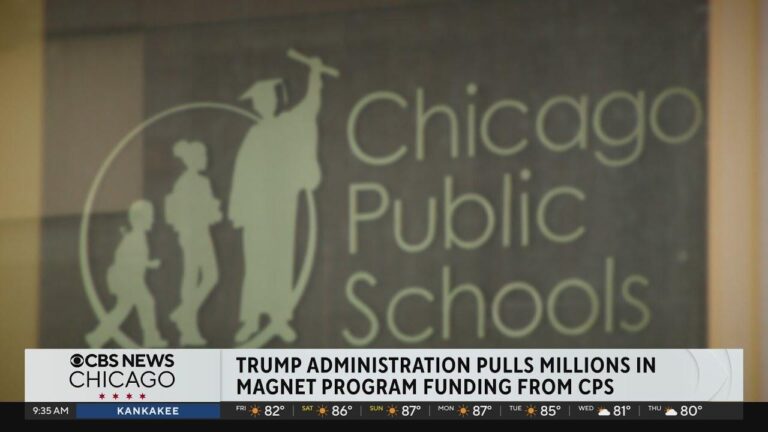Federal Funding Cuts Threaten Chicago Public Schools’ Educational Programs
Trump Administration’s Withdrawal of Vital Federal Support for Chicago Schools
The Trump administration has recently announced a substantial reduction in federal financial aid to Chicago Public Schools (CPS), retracting millions of dollars that were previously designated to support the district. This decision delivers a severe setback to one of the largest public school systems in the United States, which depends substantially on federal assistance to manage budget deficits and sustain essential educational initiatives.
The funding retraction targets critical programs aimed at supporting marginalized student populations,including after-school enrichment,special education services,and resources for students learning English as a second language. Chicago’s education officials have expressed strong opposition, warning that these cuts will deepen existing disparities and undermine ongoing efforts to enhance academic achievement across the city.
The rescinded funds were part of a federal grant intended to improve student support services and upgrade school facilities. According to CPS’s finance department,the loss of this funding could lead to:
- Elimination or reduction of extracurricular activities impacting thousands of students’ engagement opportunities
- Decreased availability of mental health and counseling services within schools
- Postponement of critical infrastructure repairs and modernization projects across multiple campuses
The U.S. Department of Education has not yet provided a detailed description for the funding cuts, leaving district leaders scrambling to identify option financial resources to protect vulnerable student groups.
| Program | Funding Before Reduction | Estimated Cut | Consequences |
|---|---|---|---|
| After-School Enrichment | $12 million | $4 million | Shortened program hours and fewer student slots |
| Special Education | $8 million | $2.5 million | Reduced individualized support services |
| Facility Upgrades | $5 million | $1.8 million | Delays in essential renovations |
Impact on Student Services and School Staff Amid Budget Constraints
The abrupt withdrawal of federal funds has forced CPS administrators to confront tough choices affecting both student programs and personnel. One of the most immediate consequences is the scaling back of extracurricular offerings such as arts, athletics, and advanced placement courses-programs that provide critical enrichment beyond standard academics. Educators warn that these cutbacks risk widening the achievement gap, especially in underfunded neighborhoods where public schools serve as vital community anchors.
Additionally, the district faces potential staff reductions, including layoffs and hiring freezes. Teachers and support staff are expected to bear heavier workloads as CPS strives to maintain core educational services with fewer resources. Labor unions have raised alarms about the potential decline in teaching quality and staff morale, emphasizing the long-term repercussions for student success.
| Program Area | Budget Reduction (%) | Expected Outcome |
|---|---|---|
| After-School Programs | 35% | Fewer available spots for participating students |
| Special Education Services | 20% | Decreased support staff and resources |
| Teacher Recruitment | 25% | Hiring freeze and larger class sizes |
| Arts and Music Education | 40% | Program cancellations in several schools |
Community and Educator Reactions to the Funding Cuts
Parents, educators, and community advocates across Chicago have voiced strong opposition to the federal funding reductions, highlighting the detrimental effects on student learning and school operations.Many have criticized the abrupt nature of the cuts,expressing fears about disrupted programs,staff layoffs,and overcrowded classrooms-issues that disproportionately impact low-income and minority communities.
In response, local teacher unions and advocacy organizations have called for:
- Immediate restoration of essential federal funds to preserve after-school and special education programs.
- Greater transparency from the Department of Education regarding budget decisions and allocations.
- Inclusive engagement of community stakeholders in revising budget priorities to safeguard frontline educational services.
| Area Affected | Estimated Funding Loss | Likely Consequence |
|---|---|---|
| Special Education | $12 million | Fewer support personnel available |
| After-School Programs | $8 million | Elimination of some programs |
| School Safety | $5 million | Reduction in on-site security staff |
Approaches for Chicago Public Schools to Address Financial Challenges
Facing these significant budgetary constraints, CPS must implement creative and strategic measures to maintain educational quality and equity.Prioritizing funding for programs that directly influence student achievement is critical, while deferring non-essential expenses. Strengthening partnerships with local businesses, nonprofit organizations, and higher education institutions can definitely help fill funding gaps and expand resources for after-school and enrichment programs.
Furthermore,CPS leadership should actively pursue alternative revenue sources,including:
- Targeted grant applications focused on educational innovation and technology upgrades.
- Expanded fundraising efforts engaging alumni networks and community stakeholders.
- Operational cost-saving initiatives such as energy efficiency programs and shared services with neighboring districts.
| Strategy | Expected Benefit | Estimated Timeline |
|---|---|---|
| Community Collaborations | Increased program funding and resources | 3 to 6 months |
| Grant Acquisition | Funding for new technologies and programs | 6 to 12 months |
| Efficiency Improvements | Reduced operational expenses | Ongoing |
Conclusion: Navigating the Future of Chicago Public Education
The Trump administration’s decision to retract millions in federal funding from Chicago Public Schools presents a formidable challenge to an already financially strained system. As CPS confronts these fiscal pressures, the district’s capacity to sustain vital educational programs and adequately support its students is at risk. Moving forward, educators, policymakers, and community leaders will closely monitor the situation, seeking innovative solutions to stabilize and strengthen public education in Chicago amid these unprecedented budgetary hurdles.





